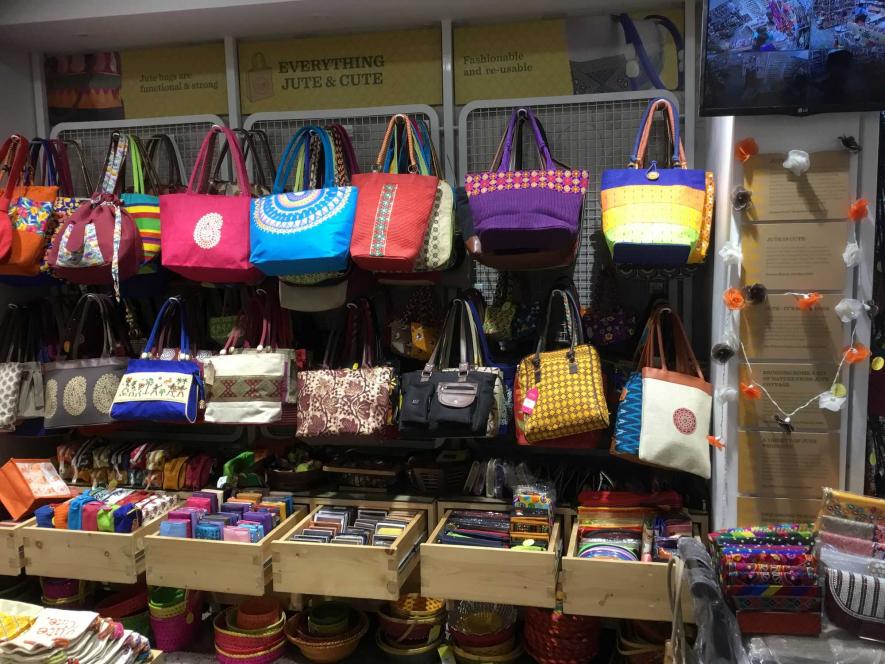Lockdown: PMO Pushes for Jute Bag Supplies, Mamata Relents on Mill Reopening

Representational image. | Image Courtesy: Justdial
Kolkata: Circumstances appear to have forced West Bengal’s chief minister Mamata Banerjee to call a halt to her practice of ignoring the Union Home Ministry’s COVID-19-related advisories and orders that are not to her liking.
An example is the repeated instruction from the Home Ministry to the West Bengal government on allowing initially limited, calibrated resumption of jute mill operations to facilitate resumption of B Twill jute bag supplies for the Rabi marketing season. As crop arrivals in the ‘mandis’ in Northern states slowly picked up nearly a month ago, the Ministry issued two reminders in quick succession.
But, the West Bengal chief minister first responded with a permission to allow reopening with 15% workforce. Subsequently, she was prepared to permit deployment of a higher percentage of workforce but the jute mill industry contended that the objective of resuming worthwhile supplies of B Twill bags won’t be met if mills were to abide by the state stipulations. Also viability was a factor they couldn’t wish away. This is what the Indian Jute Mills Association (IJMA), in its communications to ‘Nabanna’, the state secretariat, said.
As uncertainties over supplies of jute bags persisted, and as the weather department made optimistic projections about Monsoon 2020 and the Union Agriculture Ministry found the Kharif prospects promising, the Prime Minister’s Office (PMO) decided to intervene.
Bhaskar Khulbe, advisor to the Prime Minister – he is a West Bengal cadre IAS officer – posted the chief minister and chief secretary, Rajiva Sinha, about the ground realities and sought their intervention at the earliest.
Khulbe’s letter dated May 29 to Sinha read: “ ........You are well aware that I have made a request to the Hon’ble Chief Minister for allowing to deploy full workforce in the 59 functional jute mills of West Bengal so that they are able to attain the daily production capacity 10,000 bales per day by 15.6.2020. ...... inability of the jute mills to meet the mandatory packaging requirements would not only be detrimental to the interest of jute farmers and industrial workmen in West Bengal, but it might also become a compelling reason for further dilution of the mandatory jute packaging requirements, which can be easily avoided if the aimed production capacity is attained quickly”.
The letter noted IJMA’s assurance about mills abiding by social distancing and safety guidelines. Significantly, the PMO advisor’s communication mentioned dates for “feedback” and “further review of the matter”.[five hundred B Twill bags, each weighing 580 gm, make a bale].
“I can’t recall when PMO last took such active interest in supplies of jute bags for foodgrain packaging, which has a direct bearing on the operations of Food Corporation of India and other state procurement agencies”, Sanjay Kajaria, a former IJMA chairman, told NewsClick.
With even a date fixed for the next review, hopefully things should get moving. Of course, at the moment, there is a shortage of hands, Kajaria pointed out.
Contents of New Delhi’s advisories and orders issued by competent authorities and observations made by the West Bengal chief minister suggest that her sole concern was to prevent further spread of COVID-19 and that she did not want to explore any option to address her concerns, complying simultaneously with the Centre’s instructions.
For example, Union textiles secretary Ravi Capoor reminded the chief secretary in a letter dated April 13: “Jute and Jute Textiles are essential commodities under Essential Commodities Act 1955”.
Based on the Jute Packaging Act 1987, at present there is 100% jute packaging of foodgrains. As per the latest supply plan of the department of food & public distribution, the jute industry will be required to supply around six lakh bales of B Twill bags, including the backlog, within May 2020 which may not materialise if the mills are not allowed to resume immediately.
This position lends itself to three inferences: first, ‘Nabanna’ used its executive powers to deny permission to resume jute production, as desired by the Centre; second, in view of the urgency of requirements for B Twill jute bags, New Delhi has had to dilute provisions of the 1987 Act to the permissible extent and place orders to the extent of anticipated shortfall on HDPE/PP bag manufacturers with a provision for passing the unutilised quantum of indents to jute mills should the latter’s resumption warrant. Third, as for jute mill workers, it was a “no work no payment situation”, an early reopening would have brought some financial relief for them.
In recent days, reopening and resumption of operations have improved to an extent but shortage of hands is preventing a step-up in capacity utilisation which, at the moment, is a maximum of 60%, says Kajaria.
The jute mill industry’s assessment seems to be that having lost patience with the successive extension of the lockdown, a good number of workers managed, despite sweltering heat, to reach their native places in Bihar and Uttar Pradesh. The then approaching Eid festival was a factor for many Muslim workers from outside West Bengal. Given their financial distress, an early return to mill work is unlikely.
For the jute mill industry, the intervention by PMO has become a question of proving their reliability as suppliers of bags for foodgrain packaging. It wants to temporarily recruit additional hands, including from amongst migrant workers, with “officially permitted exemption from Provident Fund obligations.”
The industry’s second suggestion is that mills be allowed to engage women workers in night shifts. A letter listing these demands and the backdrop was sent by IJMA to state labour minister Moloy Ghatak on June 2.
In this context, NewsClick spoke to workers and trade union leaders to know their reaction.
Debasish Dutta, general secretary of Federal Chatkal Mazdoor Union (FCMU), affiliated to the All-India Trade Union Congress, said this time round, the new factor is COVID-19. Every year April-June is a lean period for industrial activity, as a large number of workers from outside the state visit their native places for various reasons, which include, inter alia, social obligations, family commitments and agricultural activity.
Regarding the proposal to hire extra hands without statutory payment obligations, Dutta said it’s a move to engage the contractor’s men.
As for deploying women workers in night shifts, FCMU wants IJMA to ascertain the views of the National Commission for Women and the state-level women’s outfits. At present, women workers in jute mills are few and far between. They won’t account for even 5% of the workforce. They mainly handle the cloth and sack sewing, according to Dutta.
General secretary of Centre of Indian Trade Unions (CITU), Anadi Sahu, who was labour minister in the Buddhadeb Bhattacharjee Ministry, told NewsClick : “We will insist that the new hands are not shabbily treated; their operational safety must be ensured. Meaningful help can be given from the worker welfare funds built with contribution of cess from employers and workers, which are lying with the welfare boards. Unfortunately, we do not feel the presence of the labour department in West Bengal.”
Sahu said in the State, the Labour Minister, labour secretary, and labour commissioner have not bothered to hold meetings on workers’ issues with trade unions in this crisis phase. The names of about one crore distressed workers are on a list available with the state authorities. They can be paid Rs 1,000 per head from the fund lying unused, he said, adding that unfortunately “that’s not an issue with our chief minister.” He further said that their union wasagainst deploying women in night shifts.
Benoy Sarkar, secretary-general of National Union of Jute Workers, said their union had supported the lockdown initially but as it was prolonged, poorly paid workers’ miseries multiplied and they felt a strong urge to see their relatives in their native place. “The lockdown is an instance of poor implementation both by the Centre and the state government,” he said.
Sarkar said, new hands, if recruited, must be given protection, as provided in the statute. As for engaging women in night shift, he said : “Our union, affiliated to Indian National Trade Union Congress, is flexible on this issue. After all, we can’t overlook the fact that today thousands of ladies work at night in the IT companies”.
Ashok Ghosh, general secretary of United Trades Union Congress, sees the stipulation regarding new hands as reducing the mill workforce to the category of contract labour. “Let them improve their track record”, he said.
Their union, the Bengal Provincial Chatkal Mazdoor Union, has written to the chief minister saying they were against engaging women workers in night shift on considerations of security and conditions in mills.
Meanwhile, three mill workers – Babu Akhtar (Uttar Pradesh), Mohammed Mustafa (Bihar) and Asish Chatterjee – said each passing day meant an additional day of disappointment and not knowing when “we get some cash in hand”.
Many workers, with their backs to the wall, had to borrow from friends and well-wishers. Both the Union government and the state government are responsible for their plight; the situation has not been handled with farsight, they – members of the CITU union in their unit – told NewsClick.
The writer is a freelance journalist based in Kolkata.
Get the latest reports & analysis with people's perspective on Protests, movements & deep analytical videos, discussions of the current affairs in your Telegram app. Subscribe to NewsClick's Telegram channel & get Real-Time updates on stories, as they get published on our website.























